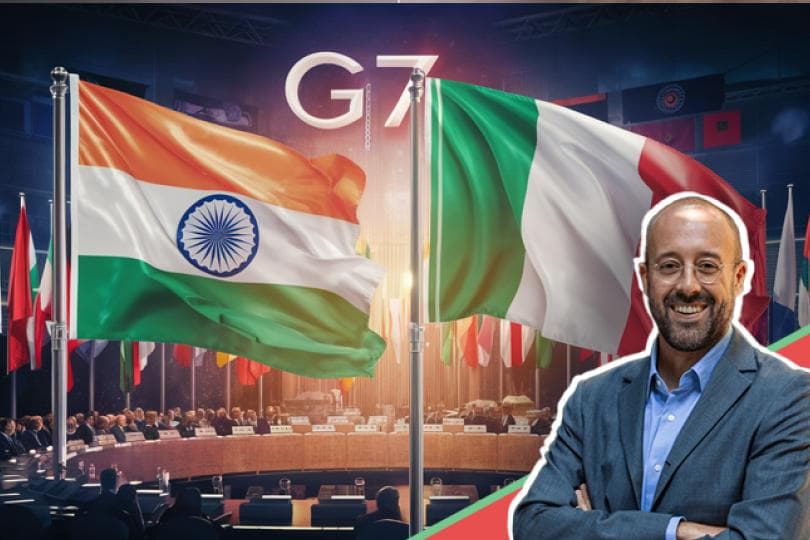The Melodi Equation
“Hello from Melodi Team” said Prime Minister Giorgia Meloni in her buoyant video selfie with Prime Minister Narendra Modi at the G7 meeting. India-Italy relations soar to new heights with an expansive roadmap for bilateral cooperation.

Italy recently hosted the G7 summit on June 13 and 14. Italian Prime Minister Giorgia Meloni invited Prime Minister Narendra Modi to the G7 Outreach Summit, marking Modi's first international visit after starting his third term as India's Prime Minister. This invitation and PM Modi's participation highlights that India-Italy relations are on the right track and improving. Over the recent years, we have seen a constant improvement in the relationship between the two countries. PM Modi's presence at the G7 underscores the good bilateral relations and growing mutual interest between India and Italy.
India is emerging in an active role on the global stage, especially as it seeks to present itself as a leader of the Global South countries. PM Modi's presence, along with other Global South leaders at the Italian G7 Summit, signals that India is willing to act as a bridge between the Global South and the Global North, including G7 and G20 countries. India hosted the G20 last year and this year, Italy has hosted the G7. The dialogue between these groupings is crucial, and India's participation reaffirms its position as a bridge on the world stage. Furthermore, Italy, and Europe in general, are demonstrating a willingness to engage in deeper dialogue with Global South countries. As relations between India and Italy have been improving, Italy's invitation to PM Modi signifies an effort to establish a more horizontal and inclusive dialogue with Global South countries, moving away from previous years' dynamics.
PM Modi's presence at the G7 summit thus indicates a positive trend for dialogue on the world stage. Despite being re-elected with a lesser majority than expected, PM Modi is likely to continue consolidating India on the global stage as a strategic, independent actor, as well as the world's largest democracy. The new Indian government should also aim to strengthen India's position as a bridge between the Global South and North, fostering worldwide dialogue and cooperation.
In 2023, bilateral trade between India and Italy reached 14.34 billion euros, nearly triple the trade amount of 5.27 billion euros in 2020. Two main reasons drive this growth: political relations and geopolitical context. The difficult decade following the Enrica Lexie case is now behind India and Italy, and their political relations are back on track: we shouldn’t forget that the two countries have longstanding relations that date back to the very first years of India’s independence. Successive Italian governments, including the Gentiloni, Draghi, and now the Meloni administration, have worked to strengthen ties with India. This political goodwill has paved the way for stronger economic relations.
In a broader geopolitical context, in recent years Italy's interest has been focusing on reducing and “de-risking” overreliance from China, despite China still being one of its major trading partners. Like other European countries, Italy is looking to diversify its commerce with other Asian countries, and India. Owing to its rapid growth and emerging consumer market, India is an attractive partner for Italy. But despite the positive trends, trade between Italy and India still has room to grow. Italy is currently India's fourth largest European trading partner, behind countries like France and Germany. Given Italy's strong manufacturing sector and mutual interests with India, there is significant potential for further improvement in trade relations.
Moreover, India's rapidly rising startup ecosystem presents another opportunity to tap into this potential. India's startups are doing incredible work, supported by the country's growing human capital and talented professionals. Foreign investors should look at India's startup landscape to engage with innovative businesses. The Indian government will need to invest in supporting and consolidating startups to help India become a global high-end technology hub, especially in a global geopolitical and geoeconomic context where competition over technological supremacy has been on the rise. Innovation is key for both Italy and India, and innovation's heart lies in startups. Strengthening relations between the two countries could start with focusing on these dynamic new enterprises.
Several elements are driving Italy's renewed interest in India. First and foremost, India is a rapidly growing economy, with a 7% growth rate last year and strong projections for the future. This growth, coupled with an expanding middle class, attracts foreign investors. While China remains a much larger economy today, it is slowing down. This economic shift is causing European countries, including Italy, to look for alternative partners in Asia.
Another crucial factor is that India is the world's largest democracy. This democratic status makes India an attractive partner for Italy, Europe, and the world in general, especially in the context of increasing global tensions between autocracies and democracies. As the world is entering an age of increasing uncertainty, competition and polarisation, India should build upon the fact that it is a democracy to show that it is a more stable, solid, and reliable partner – than China, e.g. – for all those countries who seek to diversify their trade relations and find new business opportunities. Protecting and strengthening India’s democratic ethos and institutions – while being wary of those actors and discourses who seek to weaken them – will be thus key to consolidating India’s rise on the world stage, even from an economic standpoint. Of course, these factors will also play a significant role as European countries are seeking to diversify their investments, particularly in manufacturing and high-end technology. The invasion of Ukraine by Russia and growing US-China tensions have heightened the importance of like-minded democratic partnerships. While Italy and India may not agree on everything, they share enough common ground for meaningful dialogue and cooperation.
Moreover, India has implemented significant reforms that benefit foreign investors, particularly during Prime Minister Modi's first term from 2014 to 2019. Reforms like the Goods and Services Tax (GST), “Make in India” and other initiatives have made doing business in India more appealing. These efforts have caught the attention of Italian investors, who hope that the Indian government will continue on this path of economic reform and infrastructure development.
The 2023 strategic partnership between India and Italy places a strong emphasis on defence cooperation. Italy, a leading manufacturer of naval equipment and the defence industry, sees this as a significant area of collaboration. India's strategic interests in the region align well with Italy's export capabilities, making military cooperation a key driver for enhancing relations between the two countries. However, defence is not the only focus. There are many other potential areas for collaboration, including machinery, digitalisation, startups, and people-to-people contacts. Nevertheless, defence remains central due to Italy's production capabilities and India's interest in renewing its defence industry.
Geopolitically, the Indo-Pacific region is becoming increasingly important in international relations, and India plays a leading role there. European countries, including Italy, are showing a growing interest in this region. Both Europe and Italy have published their Indo-Pacific strategies, highlighting their desire to cooperate with India, a major player in the region.
Historically, India's main partner in defence and military equipment has been Russia. However, India recognises the diplomatic costs associated with this relationship and is seeking to diversify its defence partnerships as well. India's relations with the US, France, and Japan in this field are growing, creating opportunities for other actors to engage with India, which will be a major trend in the coming years.
In recent years, India has been gaining a central role on the international stage, driven by several key factors. Firstly, India's rapid economic growth has made it an increasingly important economy. Last year, India became the fifth-largest economy in the world, surpassing the UK. Prime Minister Modi aims to make India the third-largest economy and an advanced industrialised nation by 2047. Additionally, India has a young population, with a median age of 28, compared to China’s 38. While this presents a challenge in terms of job creation, it also offers significant potential for growth.
The geopolitical context is also shifting in India's favour. With increasing tensions between the US and China, India has the opportunity to emerge as a leading political, economic, and strategic player in Asia and globally. As these US-China tensions persist, India can find new spaces to support dialogue with other countries.
Another factor is PM Modi's successful personal diplomacy over the past few years. He has reached out to many leaders worldwide, from the West, and Gulf region to Asia, and Global South, which has not only uplifted his profile globally but also contributed to strengthening India's international relations. Last year, India hosted a successful G20 summit, inviting the African Union and managing to find common ground among participants and signing a final communique.
Looking ahead, PM Modi's next term will likely focus more on domestic issues due to his diminished majority. His government will have to focus more on job creation, investments in manufacturing, land reform, and fiscal reforms. While these big domestic issues will take precedence, the more stable and prosperous India becomes, the stronger its role on the world stage will be. PM Modi's government will aim to consolidate India's growth and continue building on its international presence, even as it addresses critical internal matters.
Apart from geoeconomic and economic reasons, a significant factor behind Italy and the West shifting their focus to India is political and value-based. The world is becoming increasingly polarised, with powers like China and Russia envisioning a different global order. These countries are often seen as revisionist, challenging the current international order, which they consider based on rules established by the West.
India, however, approaches global affairs differently. Although it seeks changes on the global stage and in global policies, India engages through negotiation and reform rather than disruption. As a vocal player in international institutions like the World Bank, the International Monetary Fund, and the UN, India advocates for a greater role for the Global South on issues like debt relief and climate change. While India does not agree with Western powers on everything, it strives to reform the system from within, unlike Russia or China, which tend to disrupt it without offering a credible alternative.
This approach has made India an attractive partner for Western countries and the global South, fostering more intense dialogue. Over the past decades, China has gained significant influence worldwide, particularly through initiatives like the Belt and Road Initiative (BRI). However, many countries in Africa and Asia are becoming wary of their dependency on China and are seeking to diversify their investors and partners. India, as a major country in Asia, has become a reliable alternative.

Nicola Missaglia 🇮🇹
Deep Dive
The Trade Trend: Over the past 5 years the exports of India to Italy have increased at an annualized rate of 32%, from $1.48B in 2017 to $5.92B in 2022.
The Charm of #MELODI: Bilateral relations between India and Italy have witnessed an upswing under the leadership of PM Modi and his Italian counterpart Giorgia Meloni


































